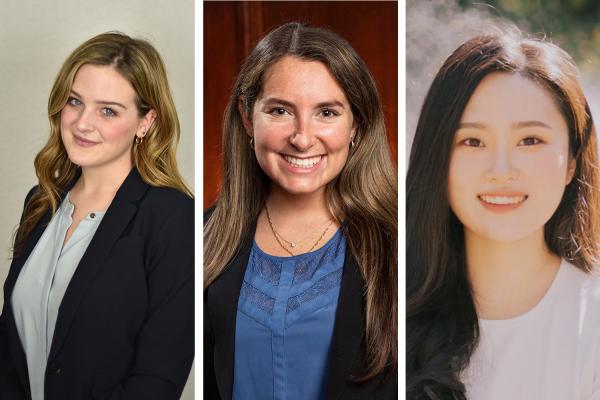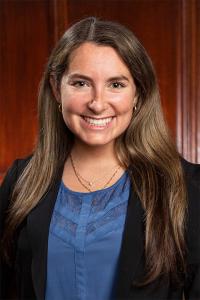Doctoral students honored for research presentations

Three Department of Psychology doctoral students received awards for their presentations at the Autumn 2025 Graduate Student Research Forum, held Nov. 10 in the Psychology Building.
Emma Bartley, Lily Brouder and Eunjee Ko were among eight students who presented their work to faculty at the department’s annual flash talk-style event, launched in 2011 to help expand interdisciplinary activity. Each had five to seven minutes to describe recent research and findings.
Also presenting at the forum were Kübra Ataç-DiCarlo (Developmental Psychology), Mona Darvishi (Social Psychology), Jingyi Luo (Cognitive Neuroscience), Julia Nauman (Intellectual and Developmental Disabilities) and Benson Zhao (Cognitive Psychology).
“The forum is great experience for the students to present their work to a larger audience outside of their labs,” said Duane Wegener, chair of the department.

Bartley, a third-year student in the Developmental Psychology program, won first place for her presentation about measuring growth in reading comprehension.
The inspiration for her research came from undergraduate experience as a literacy tutor, she said. At the time, Bartley noticed that different strategies worked for different students—but that often, literacy tutoring takes a one-size-fits-all approach, measuring a student’s success against that of their peers.
With her advisor, Stephen Petrill, Bartley studied how growth can instead be measured on a personal level. She found that for individual participants, building language and decoding skills (the ability to translate written words into spoken ones) strongly predicted growth in reading comprehension. While less significant in the context of a larger group, the growth within readers themselves was notable.
“At its core, this is showing that within-person development modeling is super important,” Bartley said.
“For a child who really struggles with reading, we’re not trying to get them better than all of their peers. We are trying to get them better compared to themselves.”

Brouder, a fourth-year student in the Clinical Psychology program, received second place in the forum for her presentation on personalized therapeutic treatments for major depression.
Existing research suggests that many treatments have similar effects on patients, Brouder noted. So how do providers know which treatments to recommend?
With advisor Dan Strunk's Depression Research Laboratory, she conducted a trial comparing standard cognitive behavioral therapy (CBT) to a skill-enhanced version, looking at how well different groups of adults with major depression responded to each.
The results suggest that people with more complex symptoms benefit more from skills-based treatment.
“I hope to continue to use analytic methods to improve and personalize treatment of depression,” Brouder said.
Ko, a fourth-year student in the Social Psychology program, received third place for her research on neural synchrony—the coordination of brain activity—and perceptions of racial discrimination.

Her work measured how black and white individuals’ brains responded to the same stimulus: a video about a black woman's poor customer service experience. Results suggested that certain variables—such as a person’s implicit racial attitudes and their level of “social identity threat,” or concern about being stereotyped or devalued because of their identity—correlated with similar brain patterns.
“Attitudes and beliefs shape different neural responses to a story,” said Ko, who is part of the Self, Stereotypes and Social Norms Lab.
“When we better understand what about a person makes them process something more similarly to someone else, that could be helpful for understanding how to relate and be empathetic toward one another.”
After the presentations, Bartley, Brouder and Ko joined other students and faculty for a reception in the Psychology Building lobby.
Participants said the forum experience was a valuable one, both giving them important presenter experience and helping them connect with peers. A similar event for undergraduate psychology majors, the Undergraduate Research Colloquium, will take place in Spring 2026.
“I had so much fun, not just presenting myself, but listening to the other presentations,” Bartley said.
“There was kind of a thread throughout many of the different presentations. It was super cool to see that even though we’re working across different disciplines, there are still connections there.”

